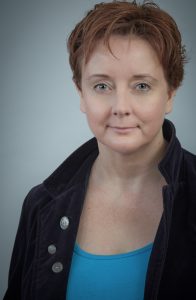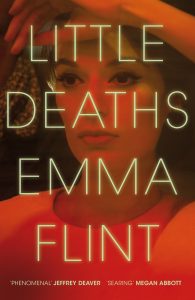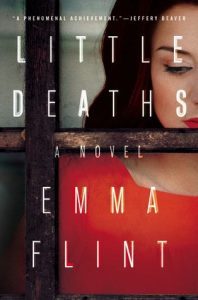How I Became A Writer
 I became a writer when I was ten years old, the same year that I discovered Agatha Christie – and therefore crime fiction. On Christmas Day 1984, I unwrapped a notebook and a box of pens, and after lunch, while everyone else dozed chipolata-stuffed in front of the TV, I made a nest in the corner of the dining room and began to write my own murder mystery.
I became a writer when I was ten years old, the same year that I discovered Agatha Christie – and therefore crime fiction. On Christmas Day 1984, I unwrapped a notebook and a box of pens, and after lunch, while everyone else dozed chipolata-stuffed in front of the TV, I made a nest in the corner of the dining room and began to write my own murder mystery.
By Boxing Day, I’d filled my notebook with a story about a series of country house murders, a French detective with an enormous moustache and his bumbling English sidekick. There was a victim who wore tweeds, and a murderer with greasy hair ‘the colour of egg yolk’.
I’d written a book.
*
I became a writer when I was twenty-two and started a novel without a plot, about a twenty-two year old girl who was lost in the world.
*
I became a writer when I was thirty-five and made myself do something I’d always been afraid to do: I booked a place on a Skyros writing course, tutored by Julia Bell. Our first exercise was to take a walk and find a place to sit, to observe. And then to write five sentences, describing what we were experiencing through each of our senses. It’s an exercise I still use to kick-start my writing after a break, or to enter a scene.
I sat in a pub garden, my notebook open on a splintered sun-blistered table, and found I was looking at the world differently. It was as though something fundamental had shifted in me.
Two of those sentences became my first short stories. Another exercise we did in the classroom became my third. I began to hear the first weak cries of what would become my writing voice.
I read my work aloud. I listened to the feedback from my classmates and tutor. And on the last night of the course, Julia Bell told me I must keep going, must keep writing. She said I was a writer – and with that, she held up my wildest, biggest, scariest dream, and she told me it could be real. She took me seriously.
I hugged her words to me all the way home and through the following winter. I wrote more. I read more – more widely, more deeply. I thought more about what makes a book work: what makes a character walk off the page and into your mind? What makes a sentence or a paragraph or a metaphor sing to you?
In the spring of 2010, I booked a place on an Arvon course. I kept writing. I made friends with other writers, joined a critique group, stood naked and tense and terrified in front of them when they gave me feedback.
I cried. I made mistakes. I couldn’t do it.
I got back up. I kept going.

Little Deaths, Emma Flint, UK Cover
I had the germ of an idea about a woman called Ruth. I wrote about her waking up one hot morning, about the mask she put on to face the world. I didn’t know where the idea might go, but I couldn’t forget her. I spent time with her. I watched her. I learned how she walked and danced and ate and cursed.
I booked a second Arvon course, and then a third. I realised that my idea was more than a story about a single character. It wouldn’t be contained.
In 2013, I started a course at Faber and Faber, and told my classmates about the novel I was writing. I made it real.
I began to try out the words ‘I am a writer’ – on paper at first, then inside my head. And one day I said them out loud.
At the end of the course, we were offered the opportunity to read aloud from our work for two minutes. I couldn’t imagine anything would make me more nervous than I was already, so I chose the rawest and bravest and most visceral part of my book, and read it loud and slow to a room of agents and publishers. If I only had three hundred words, I wanted to make them count.

Little Deaths, Emma Flint, USA Cover
That reading was like walking into a white winter’s day: exhilarating, shocking, breathtaking.
Two weeks later, I had offers of representation from nine agents and a publisher. Choosing one felt like the most important decision I’d ever make. I couldn’t make it.
In the end, a good friend gave me some wise advice. Pick the person you can imagine saying no to, she said. Everyone will want to celebrate with you when things go well; pick the person you want in your corner on the days you can’t write. When you know you won’t make your deadlines.
I chose the agent I felt most affinity with, and who I felt understood me and Ruth Malone best. Jo Unwin wasn’t just enthusiastic about Little Deaths: she believed in it, and saw how good it could be. She was interested in my other ideas: she wanted me to have a career as a writer. And she was the person I knew would be there on the days I felt I couldn’t do it.
In the spring of 2014, I sent her what I’d written of Little Deaths so far, and we got to work. It took us eighteen months to polish my raw rough material into something that hinted at the novel it could be. In September 2015, we sent it out, and within two weeks I had six offers of publication.
At forty-one, I became a writer.
—
Emma Flint grew up in Newcastle upon Tyne, and has been writing fiction since she knew what stories were. She graduated from the University of St. Andrews with an MA in English Language and Literature, later completing a novel-writing course at the Faber Academy. She worked in Edinburgh for four years, and now lives in north London.
Follow her on Twitter @flint_writes
Buy Little Deaths:
About Little Deaths
“A phenomenal achievement.”—Jeffery Deaver
“A gem of a whodunit.”—Mary Kubica, author of The Good Girl
It’s 1965 in a tight-knit working-class neighborhood in Queens, New York, and Ruth Malone–a single mother who works long hours as a cocktail waitress–wakes to discover her two small children, Frankie Jr. and Cindy, have gone missing. Later that day, Cindy’s body is found in a derelict lot a half mile from her home, strangled. Ten days later, Frankie Jr.’s decomposing body is found. Immediately, all fingers point to Ruth.
As police investigate the murders, the detritus of Ruth’s life is exposed. Seen through the eyes of the cops, the empty bourbon bottles and provocative clothing which litter her apartment, the piles of letters from countless men and Ruth’s little black book of phone numbers, make her a drunk, a loose woman–and therefore a bad mother. The lead detective, a strict Catholic who believes women belong in the home, leaps to the obvious conclusion: facing divorce and a custody battle, Malone took her children’s lives.
Pete Wonicke is a rookie tabloid reporter who finagles an assignment to cover the murders. Determined to make his name in the paper, he begins digging into the case. Pete’s interest in the story develops into an obsession with Ruth, and he comes to believe there’s something more to the woman whom prosecutors, the press, and the public have painted as a promiscuous femme fatale. Did Ruth Malone violently kill her own children, is she a victim of circumstance–or is there something more sinister at play?
Inspired by a true story, Little Deaths, like celebrated novels by Sarah Waters and Megan Abbott, is compelling literary crime fiction that explores the capacity for good and evil in us all.
Category: Contemporary Women Writers, On Writing
Comments (7)
Trackback URL | Comments RSS Feed
Sites That Link to this Post
- How I Became A Writer | Women Writers, Women’s Books | Writer's Blog | November 24, 2016





























So much of what you say resonates with my experiences, Emma. I think that the day you start to call yourself a writer to others is the day the fragile dream starts to become a reality. It’s a brave step to make that statement when there is no published work behind you – but that is what needs to happen. And like you, I chose Jo Unwin as my agent. I came so close to signing with someone else, but in my heart, I knew it wasn’t the right fit and I walked away. I did of course, wonder if I should have taken the bird in the hand and decided that the wrong relationship would be destructive.Two months later I met Jo and this time I knew I was on the right track.
Hi Emma, Congratulations on having so many interested agents and not even on a completed novel, quite an accomplishment. A compelling way to choose an agent and I can definitely see the merits of wanting someone who is going to be in the trenches with you. I chose my agent for similar reasons, she just seemed so passionate about my material and like someone I could cry to and gripe with. In retrospect, I maybe should have gone with a larger agency, as a few years later, she decided to leave the business, and her couple of employees scattered. At a larger agency, if an agent leaves, you may have the option of being passed to someone else. Unfortunately, I find myself in the querying vortex once more with my new book. But you never, ever know what can go wrong – or right. I’ll be interested to read your story since it takes place in Queens!
Hi Charlotte
Thanks for the thoughtful response. I think there are pluses and minuses to every option – and we’re all wise in retrospect 🙂 Best of luck with your new book, and on developing a great relationship with your new agent.
Emma.
Ah! Skyros! That place has inspired so many of us to go on and write, sing, act… your article really brings home the importance of somebody saying “I believe in you” because writing is such an up and down sensation of am I producing brilliance or am I producing crap….
Thank you for the inspiring article. I can definitely relate to the petrifying feeling of standing up in front of people and sharing work that feels so personal. I wonder – do you think the difficulty of some of the aspects of writing and sharing work in some way helped to later create your germ of idea? I ask because I feel like some of my best ideas follow times when I’ve felt like I had to go through something difficult. It’s like a different part of my imagination woke up.
Hi Harriet,
Thanks for the response – I’m glad you found the article inspiring. For me, the reactions of other people definitely helped developed my germ into a full-blown virus 🙂 I think if going through something difficult wakes up another part of your imagination and that inspires new ideas and creativity, you should keep going through those difficult experiences! Whatever helps…
Good luck!
Emma.